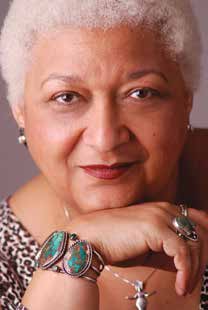
By Jewelle Gomez–
I know no one wants to read about a meeting, but here goes! I’ve been on the committee that oversees the endowment of the James C. Hormel LGBTQIA Center at the San Francisco Public Library since the new main library first opened in 1996. It was a magical feat to raise the funds for the
beautiful reading room named for James C. Hormel, a philanthropist and the first openly gay U.S. ambassador, and to create a system for collecting
and archiving the work and papers of Bay Area queer people.
Donors gave in unprecedented amounts for a couple of reasons. First, for my generation, there was no place to find the words for who you were and no one wanted to talk about it—at least no one your parents allowed you to talk to. So, we started looking in the library.
At the time, I was being raised Catholic. Each Sunday, I waited for the priest
to deliver (between the gospel and parish announcements) the list of forbidden movies and books that came out periodically. My grandmother and I would immediately look them up to see what it was that the Pope
wanted us to miss. That’s how I found the 1961 film The Children’s Hour and read the gay subtext of Cat on a Hot Tin Roof, which the 1958 film tried to pave over. Libraries therefore already had a space in queer people’s
hearts as the place freedom starts.

The other aspect that made donations imperative is that the names of those who were initial donors were to be listed on a permanent installation outside the Hormel Center—forever! For us, who frequented bars where
the windows were all painted over or you had to enter through an alley, having public acknowledgement in a city building was a “get out of jail free” card!
At the Hormel Center, you can go to a screening about the lesbian feminist activist Sally Gearhart, to a half-day on Black Horror and Healing ( January 19, 2025), and to literary readings of all stripes.
You can browse the papers of Ann Bannon and learn how she created the iconic Beebo Brinker novels. You can remember my favorite fairy, Tede Matthews, and peruse the Trannyshack collection, see photos from Robert Giard’s collection of author portraits, and read the short story that was the seed for my new novella.

Going to a meeting of the Endowment Committee is always a treat for me;
through them I get to support our history and culture and ensure they are available to everyone. Despite the significance of the internet, the library
is still a portal to a world that some might never have the opportunity to visit. Connecting with other people both on the page and in person is what makes the biggest difference.
We are facing a crisis now because so many conservatives have decided they can restrict what reading material citizens have access to in our libraries. As we know, censorship usually starts with queer books and ideas. Librarians have had to become sentinels guarding our right to read whatever we choose.
Queers no longer have to meet behind closed curtains or hide our faces going out to bars. But there are still many who wish we’d go back to the old days. Going to a meeting might not be the most exciting thing when you first think about it, but it helps us protect what is precious from those who would burn it. As Doctor Who said, “We’re in a library! Books! The best weapons in the world … arm yourselves!”
Jewelle Gomez is a lesbian/feminist activist, novelist, poet, and playwright. She’s written for “The Advocate,” “Ms. Magazine,” “Black Scholar,” “The San Francisco Chronicle,” “The New York Times,” and “The Village Voice.” Follow her on Instagram and Twitter @VampyreVamp
Leave Signs
Published on November 7, 2024
Recent Comments